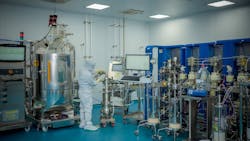Biosimilar approvals create ‘golden’ opportunity for contract manufacturing organizations: GlobalData
Given the FDA’s record-breaking number of biosimilar approvals in 2024, and as the patents for blockbuster drugs expire, contract manufacturing organizations (CMOs) specializing in biologics stand to benefit from this growing market, finds data and analytics company GlobalData.
Biosimilars, cost-effective alternatives to biologics, represent one of the biopharma industry’s most dynamic growth markets with the potential to transform the CMO landscape, according to GlobalData’s Bio/Pharmaceutical Outsourcing Report.
“FDA biosimilar approvals reached a record 19 in 2024, with projections indicating that 2025 could surpass this milestone trend,” GlobalData contends. “This presents a golden opportunity for contract manufacturing organizations (CMOs) specializing in biologics, as more blockbuster drugs approach patent expiration and regulatory barriers to entry diminish.”
The global biosimilars market is expected to grow at a compound annual growth rate (CAGR) of nearly 20% through 2030, as patents for blockbuster biologics expire, offering a potentially lucrative pathway for CMOs.
GlobalData argues that the momentum for biosimilars is “set to accelerate” noting that patents for 14 biologics expired in 2024, including major products like UCB SA’s Cimzia and Johnson & Johnson’s Simponi” and that “even more biologics — 18 — will lose patent protection in 2025, paving the way for a new wave of biosimilar entrants, including Amgen’s Prolia and Roche’s Perjeta.”
Currently, 90% of biologics facing patent expiry over the next decade lack biosimilar candidates creating a potential opportunity, according to Samsung Bioepis’ second quarter 2025 biosimilar market report released last month.
Celltrion vs. Samsung Bioepis
South Korea is home to two dominant biopharma companies in the biosimilars market — Celltrion and Samsung Bioepis. While Samsung Bioepis has the largest number of approved products, Celltrion leads the overall biosimilar deals landscape, according to GlobalData.
“Given Celltrion’s involvement in most of the deals, both globally and locally, the company leads the overall biosimilar deals landscape in South Korea and is expected to have an edge on deal-making strategy over other South Korean players,” GlobalData pharma analyst Nelluri Geetha said in a statement.
Sung Yoo, head of the Bio Platform Center at Edaily, noted in a recent column that the lines between these two companies are “now blurring” with the convergence of their respective strategic targets.
While Samsung Biologics “has long relied on CDMO and biosimilar operations (via affiliate Samsung Bioepis) as its twin engines,” the company is “now seeking to accelerate growth through expansion into novel drug development,” Yoo said. “Meanwhile, Celltrion is executing a strategy to transform into a global biopharma player by building on its biosimilar base, with additional investments in novel drugs and CDMO.”
Celltrion contends it is South Korea’s largest manufacturer and exporter of biosimilars, with an annual production capacity of 250,000 liters. However, in 2024, the company also created a wholly owned CDMO subsidiary — Celltrion BioSolutions — to drive growth beyond its core biosimilar business.
Celltrion BioSolutions plans to break ground on a 100,000-liter production plant in the first half of 2025, with commercial production slated to begin in 2028 and a long-term goal of achieving domestic capacity of up to 200,000 liters.
BRICS countries
With Brazil, Russia, India, China, and South Africa (BRICS) nations exploring barrier-free regulations for biosimilars and biologics, these countries could provide a “counterbalance” to the challenges posed by U.S. tariffs “fostering healthy competition and reducing production costs,” according to GlobalData.
While the intergovernmental organization is a loose coalition of non-Western economies, GlobalData contends that BRICS member nations have emerged as key players in global pharmaceutical manufacturing bolstering access to affordable medicines, as President Trump has doubled down on his threat to target the pharma industry with tariffs meant to bring drug manufacturing back to the U.S.
“By advancing regulatory harmonization for biosimilars and biologics, BRICS nations are positioning themselves to offset the pressures created by U.S. trade policies,” Leyla Hasanzadeh, GlobalData’s senior research analyst for health economics and market access, said in a statement.
About the Author
Greg Slabodkin
Editor in Chief
As Editor in Chief, Greg oversees all aspects of planning, managing and producing the content for Pharma Manufacturing’s print magazines, website, digital products, and in-person events, as well as the daily operations of its editorial team.
For more than 20 years, Greg has covered the healthcare, life sciences, and medical device industries for several trade publications. He is the recipient of a Post-Newsweek Business Information Editorial Excellence Award for his news reporting and a Gold Award for Best Case Study from the American Society of Healthcare Publication Editors. In addition, Greg is a Healthcare Fellow from the Society for Advancing Business Editing and Writing.
When not covering the pharma manufacturing industry, he is an avid Buffalo Bills football fan, likes to kayak and plays guitar.
